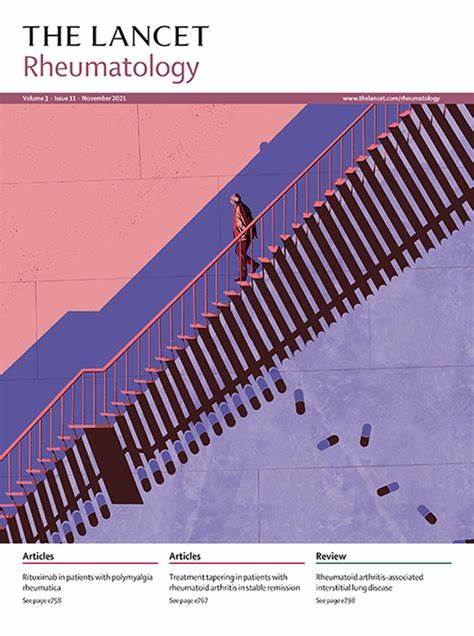2000-21年英国妊娠期自身免疫性疾病流行趋势:一项回顾性队列研究
IF 16.4
1区 医学
Q1 RHEUMATOLOGY
引用次数: 0
摘要
背景:自身免疫性疾病在世界范围内日益普遍,并不成比例地影响育龄妇女,包括怀孕期间的妇女。考虑到自身免疫性疾病、合并症和不良妊娠结局的危险因素之间的关联,我们旨在评估妊娠期自身免疫性疾病的负担。方法:这是一项基于英国人群的回顾性队列研究,使用从两个大型数据库(临床实践研究数据链Gold和Aurum)和相关妊娠登记中常规收集的数据。每年计算17种自身免疫性疾病(艾迪逊病、斑秃、强直性脊柱炎、乳糜泻、炎症性肠病(包括克罗恩病和溃疡性结肠炎)、格雷夫斯病、桥本甲状腺炎、多发性硬化症、重症肌无力、牛皮癣、银屑病关节炎、类风湿性关节炎、Sjögren病、SLE、系统性硬化症、1型糖尿病、2000年1月1日至2021年12月31日期间育龄妇女(15-49岁)妊娠中的白癜风和白癜风。使用Logistic回归来估计比值比,描述女性特征(年龄、种族、剥夺、BMI、吸烟状况和妊娠)、合并症和自身免疫性疾病之间的关系。患者和公众参与代表参与了研究问题的制定。他们还在与临床医生和研究人员的合作中发挥了关键作用,以确定和考虑研究中的自身免疫性疾病清单,并在传播结果方面发挥了关键作用。结果:2 831 472名妇女中有5 165 960例妊娠。2000-21年间,100655名确诊为自身免疫性疾病的妇女中有188208例怀孕。17种自身免疫性疾病合并的患病率有所增加,从2000年的172430例中的6058例(3.5%)增加到2021年的181832例中的8429例(4.7%)。在研究的17种自身免疫性疾病中,牛皮癣在整个研究期间的患病率最高。从2000年到2021年,大多数自身免疫性疾病的患病率有所上升。上升最快的是桥本甲状腺炎,其次是乳糜泻、格雷夫氏病和1型糖尿病。贫困地区的妇女在怀孕期间患自身免疫性疾病的几率较高(校正优势比1.10 [95% CI 1.07 - 1.14]),而少数民族妇女的患病率低于白人妇女(黑人妇女0.48 [0.45 - 0.51];亚洲女性0.81[0.77 - 0.85])。戒烟者自身免疫性疾病的发生率明显高于非吸烟者(1.20[1.18 - 1.23])。与单次怀孕的女性相比,五次或更多次怀孕的女性患自身免疫性疾病的几率明显更高(1.12[1.10 - 1.15])。有代谢和精神健康问题的妇女在妊娠期间发生自身免疫性疾病的几率显著增加(2型糖尿病,1.41 [1.30 - 1.53];高血压,1.07 [1.01 - 1.13];焦虑,1.15 [1.12 - 1.19];抑郁症,1·17[1·14-1·20])。解释:妊娠期自身免疫性疾病的负担日益增加,需要研究其对结局的影响。卫生政策应解决专业护理方面的差距,确保个人获得循证护理,以防止自身免疫性疾病恶化和不良妊娠结局的发展。资助:战略优先基金、医学研究理事会、国家卫生和保健研究所、经济和社会研究理事会、工程和物理科学研究理事会。本文章由计算机程序翻译,如有差异,请以英文原文为准。
Trends in the prevalence of autoimmune diseases during pregnancy in the UK, 2000–21: a retrospective cohort study
Background
Autoimmune diseases are increasingly prevalent worldwide and disproportionately affect women of reproductive age, including during pregnancy. Given the association between autoimmune diseases, comorbidities, and risk factors for adverse pregnancy outcomes, we aimed to estimate the burden of autoimmune disease in pregnancy.
Methods
This was a UK population-based retrospective cohort study using routinely collected data from two large databases (Clinical Practice Research Datalink Gold and Aurum) and associated pregnancy registers. Prevalence was calculated annually for 17 autoimmune diseases (Addison's disease, alopecia areata, ankylosing spondylitis, coeliac disease, inflammatory bowel disease (including Crohn's disease and ulcerative colitis), Graves' disease, Hashimoto's thyroiditis, multiple sclerosis, myasthenia gravis, psoriasis, psoriatic arthritis, rheumatoid arthritis, Sjögren's disease, SLE, systemic sclerosis, type 1 diabetes, and vitiligo) in pregnancies among women of reproductive age (15–49 years) from Jan 1, 2000, to Dec 31, 2021. Logistic regression was used to estimate odds ratios, describing the relationship between women's characteristics (age, ethnicity, deprivation, BMI, smoking status, and gravidity), comorbidities, and autoimmune diseases. Patient and public involvement and engagement representatives participated in formulating the research question. They also played key role in collaboration with clinicians and researchers to identify and consider the list of autoimmune diseases in the study, and played a key role in disseminating the results.
Findings
5 165 960 pregnancies in 2 831 472 women were included. In 2000–21, there were 185 208 pregnancies in 100 655 women who had a coded diagnosis of autoimmune disease. There was an increase in prevalence of the combination of 17 autoimmune diseases, from 6058 (3·5%) of 172 430 in 2000 to 8429 (4·7%) of 181 532 in 2021. Of the 17 autoimmune diseases studied, psoriasis had the highest prevalence throughout the study period. The prevalence of most of the autoimmune diseases increased from 2000 to 2021. The steepest rise was Hashimoto's thyroiditis, followed by coeliac disease, Grave's disease, and type 1 diabetes. Women in less deprived areas had higher odds of an autoimmune disease during pregnancy (adjusted odds ratio 1·10 [95% CI 1·07–1·14]), whereas minority ethnic groups had lower prevalence rates compared with White women (Black women 0·48 [0·45–0·51]; Asian women 0·81 [0·77–0·85]). Ex-smokers had significantly higher odds of autoimmune disease than non-smokers (1·20 [1·18–1·23]). When compared with women with a single pregnancy, the odds of having an autoimmune disease were significantly higher for women with five or more pregnancies (1·12 [1·10–1·15]). Women with metabolic and mental health conditions had significantly higher odds of having an autoimmune disease during pregnancy (type 2 diabetes, 1·41 [1·30–1·53]; hypertension, 1·07 [1·01–1·13]; anxiety, 1·15 [1·12–1·19]; depression, 1·17 [1·14–1·20]).
Interpretation
The growing burden of autoimmune diseases in pregnancy calls for research into their impact on outcomes. Health policy should address gaps in specialised care to ensure individuals receive evidence-based care to prevent deterioration of the autoimmune disease and development of adverse pregnancy outcomes.
Funding
Strategic Priority Fund, Medical Research Council, National Institute for Health and Care Research, Economic and Social Research Council, and Engineering and Physical Sciences Research Council.
求助全文
通过发布文献求助,成功后即可免费获取论文全文。
去求助
来源期刊

Lancet Rheumatology
RHEUMATOLOGY-
CiteScore
34.70
自引率
3.10%
发文量
279
期刊介绍:
The Lancet Rheumatology, an independent journal, is dedicated to publishing content relevant to rheumatology specialists worldwide. It focuses on studies that advance clinical practice, challenge existing norms, and advocate for changes in health policy. The journal covers clinical research, particularly clinical trials, expert reviews, and thought-provoking commentary on the diagnosis, classification, management, and prevention of rheumatic diseases, including arthritis, musculoskeletal disorders, connective tissue diseases, and immune system disorders. Additionally, it publishes high-quality translational studies supported by robust clinical data, prioritizing those that identify potential new therapeutic targets, advance precision medicine efforts, or directly contribute to future clinical trials.
With its strong clinical orientation, The Lancet Rheumatology serves as an independent voice for the rheumatology community, advocating strongly for the enhancement of patients' lives affected by rheumatic diseases worldwide.
 求助内容:
求助内容: 应助结果提醒方式:
应助结果提醒方式:


